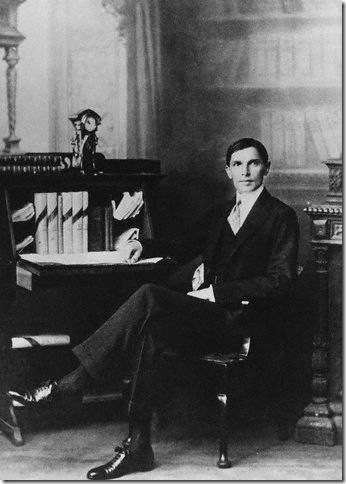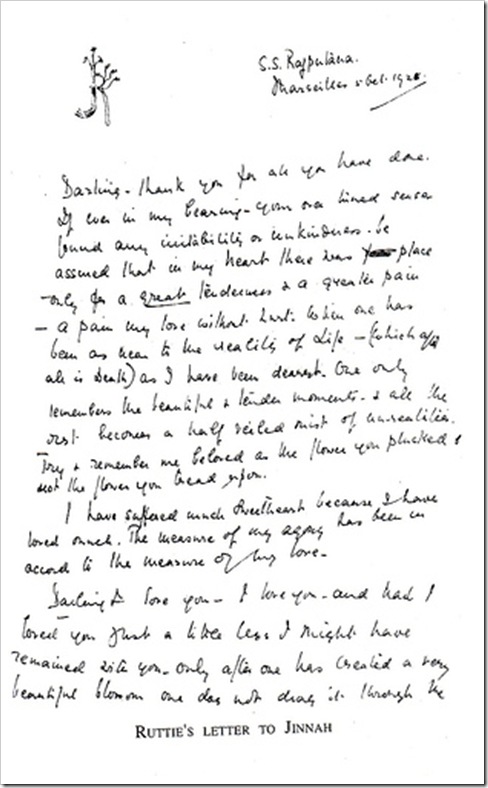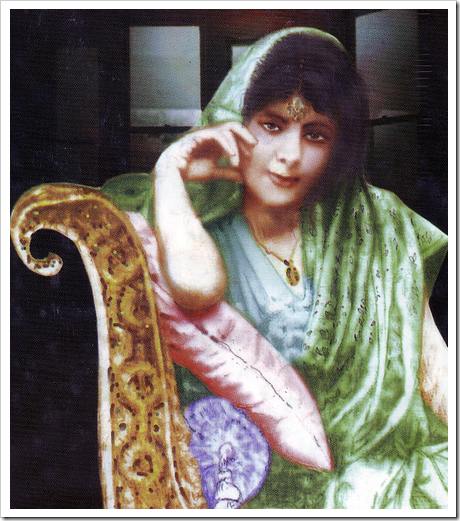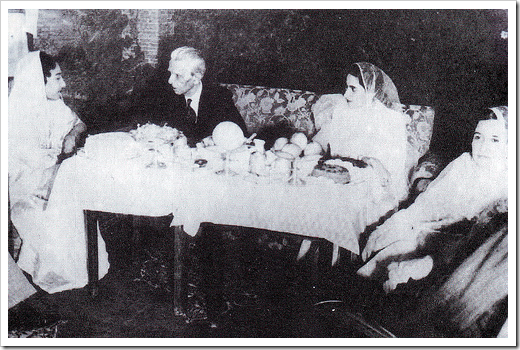by Hector Bolitho
Jinnah Creator of Pakistan is the best biography of Jinnah yet written by a Westerner. Hector Bolitho is an English journalist. In this selection he considers some of the significant influences on the young Jinnah. Most of the Jinnah’s observers have noted that he was strict and methodical in his habits and attitudes. Both in small matters, such as his monocle, and in large matters, such as his belief in constitutional procedure, Jinnah remained consistent from his early teens to the end of his life. The picture Bolitho gives of the able young student and advocate, aware of his abilities and of the obstacles before him, is an important clue to Jinnah’s later activities.
In the heart of the bustling new city is old Karachi, the town of mellow houses that Jinnah knew as a boy. Some of the streets are so narrow, and the houses so low, that the camels ambling past can look in the first-floor windows. In one of these narrow streets, Newnham Road, is the house – since restored and ornamented with balconies – where Mohammad Ali Jinnah was born. The date is uncertain: in the register of his first school, in Karachi, the day is recorded as October 20, 1875; but Jinnah always said that he had been born on Christmas Day – in 1876. If the 1876 date is correct, he was seven days old when Queen Victoria was proclaimed the Kaiser-i-Hind, on the Plain of Delhi. He was born in the year that the Imperial India was created, and he lived to negotiate, with Queen Victoria’s great-grandson, for its partition and deliverance from British rule.
In one of the tenement houses in old Karachi there lives Fatima Bai, a hand some old woman, aged eighty six; one of the few persons who can remember Mohammad Ali Jinnah when he was a boy. She was a bride of sixteen, married to one of the Jinnah’s cousins, when she arrived in the family home in Karachi. The year was 1884. Jinnah was then seven years old.
Fatima Bai lives with her son, Mohammad Ali Ganji , in rooms at the top of a flight of bare stone stairs. I went there one evening and she received me in her own room, in which there were her bed, an immense rocking-chair, and a wardrobe where among the bundles of clothes, the few existing documents – the family archives – were kept. Mohammad Ali Ganji spread the papers on the bed, beside his mother, and then gave me the bones of the early story.
Although Jinnah’s immediate ancestors were Muslims – followers of the Khoja sect of the Aga Khan – they came, like so many Muslim families in India, of old Hindu stock. Mohammad Ali Ganji said that the family migrated to the Kathiawar Peninsula from the Multan area, north of the Sind desert, long ago. From Katiawar, they moved to Karachi, where they settled and prospered in a modest way.
When Jinnah was six years old, he was sent to school in Karachi. When he was ten, he went on a ship to Bombay, where he attended the Gokul das Tej Primary School, for one year. He was eleven when he returned to Karachi, to the Sind Madrasah High School; and he was fifteen when he went to the Christian Missionary Society High School also in Karachi.
Mohammed Ali Ganji said, “In the same year that he was at the Mission School, he was married by his parents as was the custom of the country, to Amai Bai, a Khoja girl from Kathiawar. In 1892 he went to England to study law and, while he was there, his young wife died. Soon afterwards, his mother died, and his father became very poor…”
Fatima Bai raised her hand and interrupted her son: she said, “He was a good boy; a clever boy. We lived, eight of us, in two rooms on the first floor of the house in Newnham Road. At night, when the children were sleeping, he would stand a sheet of cardboard against the oil lamp, to shield the eyes of the children from the light. Then he would read, and read. One night I went to him and said, ‘You will make yourself ill from so much study,’ and he answered, ‘Bai, you know I cannot achieve anything in life unless I work hard.’ “
As Fatima Bai finished her story, an old man appeared at the door; a smiling old Muslim with tousled, snow-white hair. His name was Nanji Jafar. He came in, sat in the rocking-chair and said that, as far as he knew, he was in his eighties. Though he had been at school with Jinnah, all he could recall was, “I played marbles with him in the street…” When I asked, “Can you remember anything he said to you?” he looked from beneath his thick brows and repeated, “I played marbles in the street with him.”
I asked him to close his eyes and to see, once more, the coloured glass marbles in the dust. Nanji Jafar closed his eyes and deeper into his memory: then he told his only anecdote of Jinnah’s boyhood. One morning, when Nanji Jafar was playing in the street, Jinnah, then aged about fourteen, came up to him and said, “Don’t play marbles in the dust; it spoils your clothes and dirties your hands. We must stand up and play cricket.”
The boys in Newnham Road were obedient: they gave up playing marbles and allowed Jinnah to lead them from the dusty street to a bright field where he brought his bat and stumps for them to use. When he sailed for England at the age of sixteen, he gave Nanji Jafar his bat and said, “You will go on teaching the boys to play cricket while I am away.”
All Jinnah’s story is in the boyhood dictum – “Stand up from the dust so that your clothes are unspoiled and your hands clean for the tasks that fall to them….
At the time when Jinnah finished his schooling, there was an Englishman, Frederick Leigh Croft, working as an exchange broker in Bombay and Karachi. He was heir to a baronetcy – a thirty-two-year-old bachelor, described by a kinswomen who remembers him as “something of a dandy, with a freshly picked carnation in his buttonhole each morning, a recluse and wit, uncomfortable in the presence of children, whom he did not like.” But he liked Mohammad Ali Jinnah, and was impressed by his talents. Frederick Leigh Croft ultimately persuaded Jinnah Poonja to send his son to London, to learn the practice of law.
Mohammad Ali Jinnah was not yet sixteen when he sailed across the Arabian Sea, towards the western world….which was to imbue him with an Englishness of manner and behaviour that endured to his death.
Mrs. Naidu wrote of Jinnah some years later, “It seems a pity that so fine an intelligence should have denied itself the hall-mark of a University education.” Jinnah appearantly withstood the temptations of literature, and art, and even of history. His mind seldom doted on the past, and it would seem that his habits in London were narrowed down – that his way was from lectures in Lincoln’s Inn, to debates in the House of Commons, without any pausing in the National Gallery on the way. He was to do two things brilliantly in his life: he was to become a great advocate, and he was to create a nation. From the beginning, he did not dissipate his energies with hobbies, nor his strength in dalliance. His chief passions were in his mind.
In an address to the Karachi Bar Association in 1947, Jinnah recalled, “I joined Lincoln’s Inn because there on the main entrance, the name of the Prophet was included in the list of great law-givers of the world.” He spoke of the Muhammad as “a great statesman, and a great sovereign.” His appreciation of the Prophet was realistic: perhaps his political conscience, as a Muslim, had already begun to stir while he was in England.
Jinnah told Dr. Ashraf that, during the last two years in London, his time was “utilized for future independent studies for the political career” he already “had in mind.” Jinnah also said, “Fortune smiled on me, and I happened to meet several important English Liberals with whose help I came to understand the doctrine of Liberalism. The Liberalism of Lord Morley was then in full sway. I grasped that Liberalism, which became part of my life and thrilled me very much.”
This awakening in politics coincided with significant personal changes. Up to April 1894, Mohammad Ali Jinnah used his boyhood name, Jinnahbhai – bhai being a suffix used in Gujrati language which was his mother tongue. On April 14, 1894, he adopted the English fashion in names and became Mr. Jinnah, the form he used for the rest of his life. He had also abandoned his “funny long yellow coat” and adopted English clothes; and – perhaps encouraged by the sight of Mr. Joseph Chamberlain in the House – he had bought his first monocle.
It must have been an important moment in the development of his courage, and his personality, when he went to an optician’s shop in London and bought the first of many monocles, which he wore during the next fifty year – even at the end, when he was being carried into his capital on a stretcher; a dying warrior, holding the circle of glass between his almost transparent fingers.
***********************
Jinnah had said that “the Liberalism of Lord Morley” thrilled him very much. The thrill much have been intensified on June 21, 1892, when he read of the Royal Assent to the Amendment to the Indian Councils Act, empowering the Viceroy to increase the numbers in the Legislative and Provincial Councils – an amendment that gave the people of India, for the first time, “a potential voice” in the government of their country.
The beginning of Jinnah’s partiality for Liberalism was well-timed. At the end of May 1892, Mr. Gladstone spoke “with a vigour and animation most remarkable in a man of eighty-two.” He was rewarded in the following August, when the Liberals came into power after six years of Tory rule under Lord Salisbury.
The early 1890’s offered refreshing opportunities for any young novice in politics, newly arrived from India, anxious to learn, and naturally in love with agitation and reform. In 1893, when Jinnah must have recovered from his loneliness and “settled down,” he was able to listen to some of the lively debates over Mr. Gladstone’s Irish Home Rule Bill: he was able also to study English reactions to affairs in India, and Egypt; to watch the growing power of Labour, and to develop his sympathy with the political emancipation of women – a reform that became a fixed part of his political creed when he returned to India.
There was another stiring innovation, nearer his own heart. Jinnah arrived in London in time to watch – perhaps to help – the election of the first Indian, Dadabhai Naoroji, to the British Parliament, as a member for the Central Finsbury.
Dadabhai Naoroji was a Parsee, aged sixty-seven at the time of his return: for many years he had been a businessman in London. Photographs of him, in later life, reveal some of the reasons why he came to be known as the “Grand Old Man of India.” His humorous old eyes, long white beard, and relaxed hands, proclaim the teacher, about whom young Indians gathered to learn – rather than the furious agitator in love with change for its own sake.
When Dadabhai Naoroji announced his intentions to stand as Liberal candidate for Central Finsbury, Lord Salisbury committed the clumsy foly, in a speech at Edinburgh, of saying, “I doubt if we have yet got to the point of view where a British constituency would elect a black man.” The Scottish electors shouted “Shame!....” Victoria, attended by Indian servants and engrossed in her study of Hindustani, was much displeased.
The unhappy insult – addeldy unfortunate because Dadabhai Naoroji had a paler skin that Lord Salisbury – soon made the Parsee Liberal into a hero. The chapters in his biography, describing the controversy awakened by the election in Finsbury, make an exciting story. Women’s Suffrage was one of his aims, and he was therefore overwhelmed by women helpers. Among the letters sent o him was one from Florence Nightingale: “I rejoice beyond measure,” she wrote “that you are now the only Liberal candidate for Central Finsbury.”
Dadabhai Naoroji was elected, with a majority of three, and the quick-tongued Cockneys who have voted for him turned his difficult name into “Mr. Narrow Majority.”
Mohammad Ali Jinnah was caught up in the excitement of the Finsbury election, and he prospered under the influence of Dadabhai Naoroji, whom he was to serve, as secretary, fourteen years later. It is reasonable to suppose that Jinnah learned much from Naoroji’s speeches; that he absorbed some ideas from the Grand Old Man….
Mohammad Ali Jinnah returned to India in the autumn of 1896. He was then a qualified barrister, aged almost twenty, and devoted to the Liberalism he had absorbed from Gladstone, Morley, and Dadabhai Naoroji. English had become his chief language, and it remained so, for he never mastered Urdu even he was leading the Muslim into freedom, he had to define the terms of their emancipation in an alien tongue. His clothes also remained English, until the last years of his life, when he adopted the sherwani and Shalwar of the Muslim gentlemen. And his manner of address was English: he had already assumed the habit, which he never gave up, of shaking his finger at his listener and saying, “My dear fellow, you do not understand.”
Mohammed Ali Jinnah sailed for Bombay in 1897, but he was to endure three more years of penury, and disappointment, before he began to climb. Mr. M.H. Saiyid, who was Jinnah’s secretary in later years, has written of this lean time. “The first three years were of great hardship and although he attended the office regularly every day, he wandered without a single brief. The long and crowded foot-paths of Bombay may, if they could only speak, bear testimony to a young pedestrian pacing them every morning from his new abode….a humble locality in the city, to this office in the Fort,….and every evening back again to his apartments after a weary, toilsome days spent in anxious expectation.”
As the turn of the century, Jinnah’s fortune changed, through the kindness of the acting Advocate-General of Bombey, John Molesworth MacPherson, who invited the young lawyer to work in his chambers. Mrs. Naidu wrote of this as “a courteous concession – the first of its kind ever extended to an Indian,” which Jinnah remembered as “a beacon of hope in the dark distress of his early struggles.”
***********************
The second advocate resumed his story: he said: “You must realize that Jinnah was a great pleader, although not equally gifted as a lawyer. He had to be briefed with care, but; once he had grasped the facts of a case, there was no one to touch him in legal argument. He was that God made him, not what he made himself, God made him a great pleader. He had a sixth sense: he could see around corners. That is where his talents lay. When you examine what he said, you realize that he was a very clear thinker, though he lacked the polish that a university education would have given him. But he drove his points home – points chosen with exquisite selection – slow delivery, word by word. It was all pure, cold logic.”
The first advocate then told another story. “One of the younger men practicing at that time - younger than Jinnah – was M.A. Somjee, who became a High Court Judge. They were appearing, as opposed counsel in a case which was suddenly called for on hearing. Mr. Somjee was another court at the time and the solicitor instructing him asked Jinnah to agree to a short adjournment. Jinnah refused. The solicitor then appealed to the judge, who saw no objection, provided Jinnah would agree. But Jinnah would not agree: he stood up and said: ‘My learned friend should have anticipated this and he should have asked me personally for an adjournment.”
“Jinnah’s arrogance would have destroyed a man of less will and talent. Some of us used to resent his insolent manner – his overbearing ways – and what seemed to be lack of kindness. But no one could deny his power of argument. When he stood up in Court, slowly looking towards the judge, placing his monocle in his eye – with the sense of timing you would expect from an actor – he became omnipotent. Yes, that is the word, omnipotent.”
“May be,” said the third advocate, “but, always, with Jinnah one comes back to his honesty. Once when a client was referred to him, the solicitor mentioned that the man had limited money with which to fight the suit. Nevertheless, Jinnah took it up. He lost – but he still had faith in the case and he said that it should be taken the Appeal Court. The solicitor again mentioned that his client had no money. Jinnah pressed him to defray certain of the appeal expenses out of his own pocket and promised to fight the case without any fee for himself. The time, he won; but when the solicitor offered him a fee, Jinnah refused – arguing that he had accepted the case on the condition that there was no fee.”
I’ll tell you another story along that line,” said the second advocate. There was a client who was so pleased with Jinnah’s services in a case, that he sent him an additional fee. Jinnah returned it, with a note, ‘This is the amount you paid me-. This was the fee. Here is the balance-.’ “
When the three lawyers were asked, “Did you merely admire Jinnah or did any of you become fond of him?” one of them answered, “Yes, I was genuinely fond of him, because of his sense of justice. And because, with all the differences and bitterness of political life. I believe he was a man without malice: hard, maybe, but without malice.
*********************
Two of the advocates who spoke Jinnah were Hindus: One was a Parsee. Some time later, a veteran Muslim barrister gave his different, perhaps more penetrating, impression of Jinnah’s work at the Bar. “One must realize,” he said, “that when he began to practice, he was the solitary Muslim barrister of the time: there may have been one or two others, but they did not amount to a row of pins. This was in a profession made up mostly of Hindus and Parsee. Perhaps they were over-critical of a Muslim – who came from business stock-setting up such a standard of industry. There was no pleasure in Jinnah’s life; there were no interests beyond his work. He laboured at his briefs, day and night. I can see him now; slim as a reed, always frowning, always in a hurry. There was never a whisper of gossip about his private habits. He was a hard-working, celibate, and not very gracious young man. Much too serious to attract friend. A figure like that invites criticism, especially in the lazy East, where we find it easier to forgive a man for his faults than for his virtues.”
*********************
During these years of Jinnah’s early success as a lawyer, he met Mrs. Sarojini Naidu, the first sophisticated, intelligent woman to observe his talents, to see beyond the arrogance of the young advocate. She wrote of him:
Never was there a nature whose outer qualities provided so complete an antithesis of its inner worth. Tall and stately, but thin to the point of emaciation, languid and luxurious of habit, Mohamed Ali Jinnah’s attenuated form is the deceptive sheath of a spirit of exceptional vitality and endurance. Somewhat formal and fastidious, a little aloof and imperious of manner, the calm hauteur of his accustomed reserve but masks – for those who know him – a naïve and eager humanity, an intuition quick and tender as a woman’s a humour gay and winning as a child’s. Preeminently rational and practical, discreet and dispassionate in his estimate and acceptance of life, the obvious sanity and serenity of his worldly wisdom effectually disguises a shy and splendid idealism which is the very essence of the man.
Mrs. Naidu’s warm regard for Jinnah was shared by many other young women who saw, as pride, what his lawyer friends called arrogance. Among them was an old Parsee lady, still living on Malabar Hill, who remembers Jinnah at the age of twenty-eight. She has said of him, “Oh, yes, he had charm. And he was so good looking. Mind you, I am sure he was aware of his charm: he knew his own strength. But when he came into a room, he would bother to pay a compliment – to say, ‘what a beautiful sari!’ Women will forgive pride, or even arrogance, in a man like that.”
Source: From Hector Bolitho, Jinnah Creator of Pakistan (London, 1954), pp. 3-5, 7-11, 14-5, 18-19, 21-22









